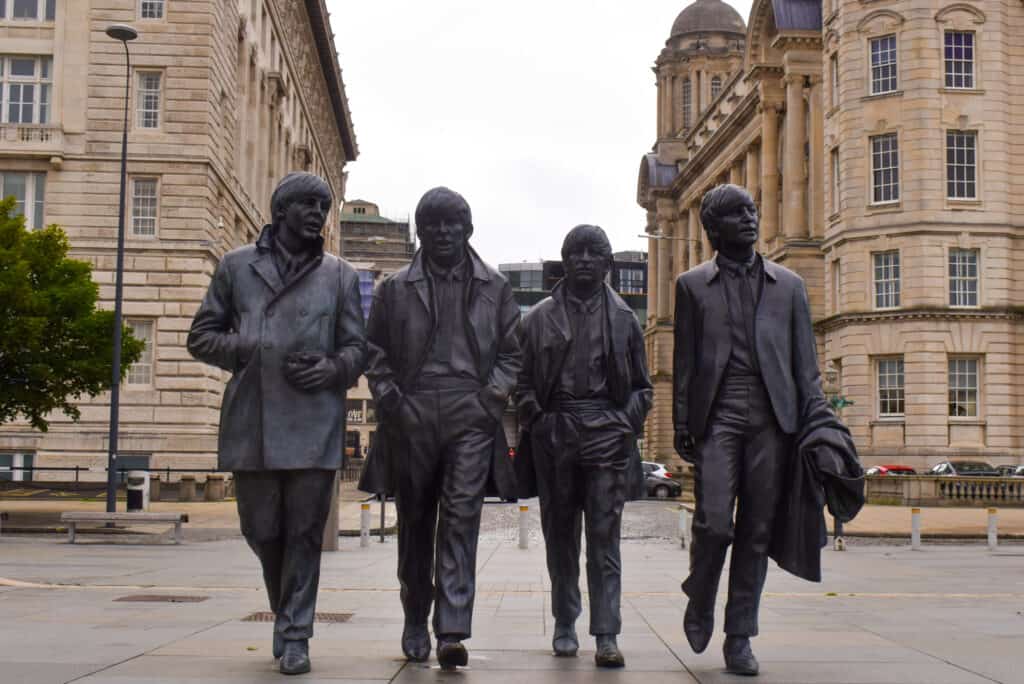George Harrison (1943 – 2001) provided lead guitars for arguably one of the most influential rock bands of the last century – The Beatles.
The musician and songwriter imparted a sense of mysticism to the otherwise mostly pop sound of the said band by adding elements from Indian culture – such as Hindu spirituality and imagery – to their cumulative work.
Although Paul McCartney and John Lennon did most of the band’s songwriting, Harrison was decently prolific, with many of the band’s albums. “Here Comes the Sun,” “While My Guitar Gently Weeps,” and “Something” were written by Harrison.
George met Lennon and McCartney who were then in a group called the Quarrymen (formed by Lennon in 1956). Eventually, the group evolved into The Beatles in 1960.

They launched their first single, “Love Me Do,” with then fourth member Stuart Sutcliffe. Upon the release of the debut album Please Please Me, Beatlemania – the phenomenon surrounding the highest-selling band of all time – was unleashed upon the world.
The Mystic and the Music
Harrison’s musical background was heavily influenced by his mother, Louise. An avid fan of music, George’s mother listened to Radio India, a weekly broadcast redolent with tablas and sitars.
The exotic and mystical music she hoped to evoke calmness in the unborn George in her womb, writes Joshua Green, Harrison’s biographer.
Interestingly, George’s father, Harold, was reluctant to indulge his son’s musical inclinations. The song “Heartbreak Hotel” by Elvis Presley was one of the things that spurred Harrison’s obsession with guitars. Harold eventually gave in, buying his son an acoustic guitar.
The Quiet Beatle
George was bestowed this nickname after the arrival of the Beatles in the United States in 1964. Harrison had taken ill and was advised to avoid speaking to preserve his voice until a scheduled appearance on The Ed Sullivan Show.
From then on, the press noticed this seemingly enigmatic behavior, much to the amusement of George himself. Coincidentally, the “restrained” band member managed a couple of vocal credits on the current album entitled “Do You Want to Know a Secret” and his first solo pen, “Don’t Bother Me.”
Exotic to mainstream
Around 1965, and due to his interest in acts such as The Byrds and Bob Dylan, he steered the band towards folk-rock and Indian classical.
He integrated native Indian instruments into many groundbreaking Beatles songs like “Norwegian Wood” and increasingly delved into philosophies such as Hare Krishna and concepts like transcendental meditation.
According to ethnomusicologist David Reck, Harrison’s use of the sitar, tambura, tabla, and other non-Western instruments were integral to the acceptance of Asian elements in pop music.
He treated these elements with reverence and skill so as to bring said music to the forefront of contemporary culture.
George’s work with the sitar got him the label “the maharajah of raga-rock,” which he later fortified by using the swarmandal – a zither-like Northern Indian instrument – in “Strawberry Fields Forever.”
Bye Bye, Beatles
He continued using these elements in his solo albums after the Beatles’ breakup in 1970. “My Sweet Lord” from the album All Things Must Pass notably employed his iconic slide guitar.
The album included his other hits from chart-topping albums and singles from his solo career, such as those he created and performed on the arduous Dark Horse Tour where he guested band members Tom Scott and Billy Preston, as well as Ravi Shankar and co.
The album reviews were possibly the most unflattering in his career, likened to the chronicles of an overtaxed and rushed performer, opined Rolling Stone. The album reached the fourth spot on the Billboard chart but failed to make waves in the UK.
He released his final EMI studio album in 1975, Thirty-Three & 1/3 on his label Dark Horse in 1976 and an eponymous album in 1979.
George Harrison also became part of the Traveling Wilburys – a supergroup that included Roy Orbison, Bob Dylan, Jeff Lynne, and Tom Petty – in 1988. The group has his brainchild, borne out of sessions with Lynne for the 1987 Harrison album Cloud Nine.
He also collaborated with numerous icons in the industry – Eric Clapton and erstwhile guitarist Ringo Starr – quite possibly helping him earn the eleventh spot in Rolling Stone magazine’s “100 Greatest Guitarists of All Time.”
He was also inducted into the Rock and Roll Hall of Fame twice – once in 1988 for his work with the Beatles and in 2004 for his solo work. Brainwashed, his last album was published posthumously in 2002 by son Dhani Harrison and bandmate Lynne.